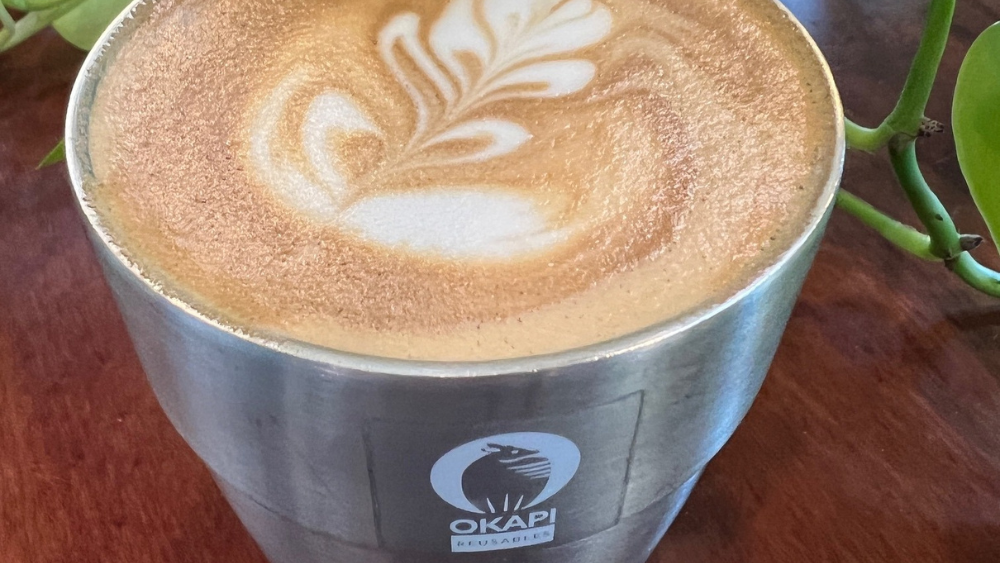Portland is passionate about its coffee. It’s also a city of people who take sustainability very seriously. Consumers and business owners are making it increasingly clear that where a product is sourced, how it’s made, and who it impacts are concerns worth paying attention to (and paying money to influence).
In the coffee industry, the cycle begins in the forested regions of South America and Africa where the beans are grown and extends to the landfill where a single-use coffee cup decomposes over decades.
Peek behind the espresso machine as we spotlight some of the players in the local coffee game who are actively working to make the industry a more socially and environmentally sustainable one.
It starts at the source
Thousands of miles separate Portland from countries like Colombia, but the distance hasn’t stopped companies like Stumptown Coffee, a certified B Corporation, from ensuring a fair, stable, and equitable partnership with producers and their farms. Most of the green coffee Stumptown buys follows a “direct trade” supply chain model. Beans are purchased directly from the same producers year after year and exported and imported through a fellow B Corporation.
Stumptown admits that direct trade isn’t perfect — climate change, for one, consistently presents challenges for all involved parties — but the company has inspired others to follow in its footsteps, blazing a trail for long-term relationships with lasting benefits for families and communities.
Nossa Familia Coffee is also committed to the concept of a “circular economy,” becoming Oregon’s first certified B Corp roaster in 2016 and upholding ongoing direct trade practices. In 2023, it donated $96,000 to local and global charities through the Giveback Coffee Donation program, $2,000 of which funded microloans for women-owned small businesses in Brazil, Nicaragua, Guatemala, and Peru.
No carbon footprints in the grounds
More than 400 billion cups of coffee are consumed every year around the world, the vast majority of which are made with roasted beans. (Yes, you can drink green coffee made with raw beans.) The roasting process alone generates an estimated 47 billion pounds of carbon dioxide emissions, accounting for 15% of the industry’s carbon footprint. To confront that statistic, some roasters are turning to alternative methods.
Cunningham Coffee Roasters uses what may be the city’s first and only fully electric, zero-emissions roaster and invites the public to see the machine in action at its Southeast Portland roastery and tasting room. Owner Melisa Cunningham said they also elect renewable power options and deliver beans to wholesale accounts in reusable tubs rather than bags with plastic liners. Cunningham Coffee and Stumptown both upcycle their burlap bags used in shipment through the city of Portland’s Community Garden program.
Last year, Nossa Familia saved over 233,900 pounds of carbon dioxide emissions by roasting with energy-efficient machines, using 100% renewable energy from Portland General Electric at its facilities, and operating all-electric delivery vehicles. It’s also pledged to reach net-zero emissions by 2030. Nossa Familia is one of dozens of coffee shops in the city that make a large percentage of their beverages with plant-based milks, which account for significantly lower greenhouse gas emissions compared to dairy milk.
A cup half full
Big results can be born from the adoption of small habits. As coffee businesses strive to lower their impact on the planet and improve the livelihoods of the people they interact with, consumers also have a crucial role to play that involves a little bit of forethought. Across Portland, many coffee shops have launched their own reusable cup incentive programs or have joined the OKAPI Reusables network, encouraging customers to help cut down on the 120 billion single-use disposable cups ending up in landfills.

OKAPI Reusables is currently offered in approx. 60 cafes.
Photo by Fetch Coffee Roasters
Not only will bringing your own cup limit the amount of waste in landfills, but not bringing one might cost you, depending on the place. Fetch Coffee Roasters and Clinton Street Coffeehouse charge customers 25 cents per disposable cup, but offer discounts to those who bring their own mug. Clinton Street also has a mug “library” where people can borrow vessels and celebrates their efforts via a “reusable cup hall of fame” displayed at the counter.
“It can feel like we are only taking small steps, but we know that if we can shift consumer behavior and suggest new norms for our coffee consumption, all our small steps can really add up,” said Kate Lor, the store manager at Clinton Street Coffeehouse. “In the last year we estimate to have saved over 30,000 disposable cups!”
Cunningham Coffee, which is also part of the OKAPI network, has a mug library and offers $1 off per pound of beans for customers who bring their own container. It doesn’t even offer disposable cups — a decision that’s part of a broader goal to change the way people think about daily coffee stops.
“We want to bring awareness, without shaming guests,” said Cunningham. “We do lose a handful of customers each day simply because we don’t have a paper/plastic cup option. But we are committed to our stance on no single-use cups.”
The numbers add up. Nossa Familia said 41% of its customers brought their own reusable cups or chose in-house service last year, keeping 52,364 single-use cups out of landfills.
At the end of the day, Portland’s position as a leader in the coffee industry isn’t just about making a really good cup of joe — it’s about caring what goes into the grind.








